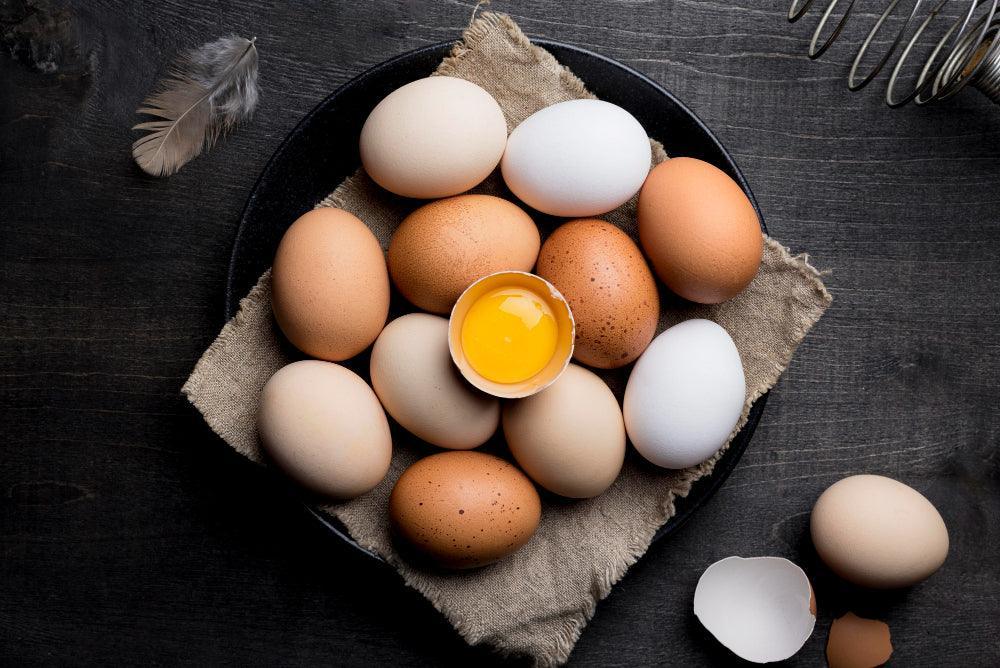Top 9 Egg Breakfast Ideas


Eggs, a staple ingredient in many breakfast dishes around the world, are renowned for their rich nutritional profile. As a source of high-quality protein, eggs contain all nine essential amino acids required by the human body for optimal growth and tissue repair. The significance of these amino acids cannot be overstated, particularly in the context of muscle development and recovery.
Additionally, eggs are a valuable source of vitamins and minerals. They are one of the few natural food sources of Vitamin D, essential for bone health and immune function, as evidenced by the Department of Health recommendations on Vitamin D intake. Furthermore, eggs contain choline, which plays a crucial role in brain health and may reduce the risk of developing neurological disorders, as suggested by neurologists at the London Neurology Centre.
The presence of lutein and zeaxanthin, two antioxidants found in the yolk, has been linked to eye health, potentially lowering the risk of age-related macular degeneration, as per research published in the British Journal of Ophthalmology. The lipid profile of eggs has been a subject of debate; however, recent studies have shown that moderate consumption does not significantly impact the risk of heart disease in healthy individuals, a point highlighted by cardiologists at the British Heart Foundation.
Despite the controversy surrounding dietary cholesterol, current guidelines indicate that dietary cholesterol found in eggs has a minimal effect on blood cholesterol levels, shifting the focus toward the overall quality of the diet, as stated by the British Nutrition Foundation.
Egg breakfast ideas abound, offering a diverse range of flavours and nutritional benefits. The versatility of eggs allows for a myriad of breakfast options, from the simplicity of boiled eggs to the richness of omelettes stuffed with an array of vegetables, meats, and cheeses. Each preparation method unlocks different textures and tastes, catering to a wide palate.
The following nine breakfast ideas showcase the culinary flexibility of eggs:

The humble scrambled egg is a cornerstone of the protein-rich breakfast, providing a substantial nutritional punch to start the day. The preparation of scrambled eggs is simple, yet the technique is paramount in achieving the perfect consistency and texture.
To embark on crafting classic scrambled eggs, one must procure fresh eggs, which are the star of the dish. The eggs should be at room temperature to ensure even cooking. A splash of milk or cream is often added to the eggs to enhance their creaminess, although this is optional and can be omitted for those with dairy sensitivities.
The process of creating scrambled eggs begins with the gentle whisking of the eggs in a bowl, ensuring the yolks and whites are well combined. A non-stick pan is preferred to prevent sticking, with a dab of butter or a drizzle of oil heated over medium-low heat.
For fluffy scrambled eggs, the key is low and slow cooking. The eggs should be stirred continuously with a wooden spoon or spatula, allowing curds to form slowly, creating a velvety texture. The eggs should be removed from the heat just before they are fully set, as they will continue to cook with the residual heat.
The versatility of scrambled eggs is evident in the endless variation possibilities. For a nutritional boost, one can fold in spinach, tomatoes, or bell peppers. The addition of cheese, such as cheddar or feta, can introduce a new flavour dimension and added calcium, while herbs like chives or parsley can provide a fresh, aromatic lift to the dish.

Sunny side up eggs, with their glistening yolks and tender whites, are a visual delight and a breakfast favourite. Achieving the perfect sunny side up egg is an art that combines the right ingredients, tools, and technique.
The simplicity of sunny side up eggs calls for minimal ingredients – primarily just fresh eggs. The tools, however, play a pivotal role. A non-stick frying pan is essential, along with a spatula, and optionally, a lid to cover the pan if one prefers the whites to be fully set without flipping the eggs.
The pan should be warmed over a medium heat, and once hot, a small amount of oil or butter is added. The eggs are then cracked gently into the pan to maintain the integrity of the yolk. For even cooking, the heat should be lowered, and the eggs cooked until the whites are set but the yolks remain runny.
Seasoning is a personal preference, but a pinch of salt and freshly ground black pepper can enhance the natural flavour of the eggs. One might also consider a sprinkle of paprika or dried herbs for additional complexity.
Sunny side up eggs are best served immediately and can be complemented with toast points, which provide a crunchy contrast to the soft eggs. Avocado slices, rich in healthy fats, not only add a creamy texture but also bring additional heart-healthy benefits to the breakfast table.

The omelette is a quintessential breakfast dish with a rich tradition in various cuisines worldwide. It's not only a delicious start to the day but also a vessel for a plethora of nutrients depending on its ingredients.
Creating an omelette requires a few key ingredients: fresh eggs, a fat like oil or butter, and your choice of fillings. The kitchenware needed is just as important, with a reliable non-stick frying pan being essential for a successful omelette, alongside a spatula for folding and a bowl for beating the eggs.
The technique for a folded omelette involves beating the eggs until homogeneous, then pouring them into a preheated, lightly greased pan. The eggs should set slightly before the fillings are added, and then the omelette is gently folded in half, allowing the residual heat to finish the cooking process.
Fillings for an omelette can range from the simple, such as ham and cheese, to the more elaborate or nutritious like mushrooms and spinach or tomato and basil. These ingredients not only add flavour but also incorporate various vitamins, minerals, and antioxidants into the meal.
Presentation is key when serving an omelette. It should be placed on a warm plate, and can be accompanied by a side salad or whole-grain toast to create a balanced meal. Garnishing with herbs adds a touch of colour and additional nutrients.

Poached eggs, with their runny yolks and tender whites, can elevate a simple breakfast to a sophisticated meal. They are a low-fat cooking method, making them a healthier option for egg enthusiasts.
The only ingredients required for poached eggs are fresh eggs and water, with a touch of vinegar optional to help the whites coagulate. The equipment needed includes a pot for boiling water, a slotted spoon for retrieving the eggs, and a timer to ensure the perfect degree of doneness.
The method begins with bringing water to a gentle simmer. Eggs are cracked into a cup and gently slid into the water. They cook for about three to four minutes until the whites are set but the yolks remain runny. They are then removed with a slotted spoon and drained on a kitchen towel.
Common Mistakes when poaching eggs include overcooking, eggs dispersing in the water, and the whites sticking to the pot. Using fresh eggs, adding vinegar to the water, and creating a whirlpool in the pot before adding the egg can help avoid these issues.
To serve, poached eggs can be placed on toasted English muffins, topped with smoked salmon for a dose of omega-3 fatty acids, or drizzled with hollandaise sauce for a luxurious finish.

Shakshuka is a beloved dish that originated in North Africa and has become a staple in Middle Eastern cuisine. This one-pan dish is not only flavourful but also packed with nutrients, making it an excellent breakfast choice.
Shakshuka is traditionally a mixture of tomatoes, onions, peppers, and spices, with eggs poached directly in the mixture. The dish is often spiced with cumin, paprika, and cayenne, which add not only complex flavours but also contain antioxidants, highlighting the dish's balance of taste and health.
The ingredients for shakshuka include ripe tomatoes, bell peppers, onions, garlic, olive oil, spices, and eggs. The preparation involves sautéing the vegetables and spices before adding the tomatoes to create a rich sauce, into which the eggs are cracked and baked.
Shakshuka has a rich cultural history, often served with bread for dipping. It varies by region, with some adding artichokes or potatoes. Each variation provides its own set of nutrients, demonstrating the dish's versatility in accommodating different dietary needs and preferences.
When baking shakshuka, it's important to monitor the eggs closely to achieve the desired doneness. Serving the dish directly from the pan not only makes for an impressive presentation but also preserves the warmth and flavours, essential for maximizing the sensory experience.

Breakfast burritos are a hearty and convenient option for the first meal of the day. They are highly customizable, making them a popular choice for those seeking a nutritious and portable breakfast.
A standard breakfast burrito typically includes a flour tortilla filled with eggs, cheese, potatoes, and a protein such as bacon or sausage. For a healthier twist, whole wheat tortillas, lean proteins like turkey bacon, and an abundance of vegetables can be used.
To assemble a breakfast burrito, the fillings are layered onto the centre of a tortilla. The ingredients should be evenly distributed to ensure each bite is balanced in flavour and texture. The tortilla is then folded and rolled to encase the fillings securely.
The breakfast burrito easily adapts to various dietary preferences. A vegetarian version might include beans and tofu, while a spicy rendition could feature jalapeños and a spicy salsa. For a low-carb option, a lettuce wrap can replace the tortilla.
The key to a well-wrapped burrito is to tuck in the sides while rolling it tightly to prevent the fillings from spilling out. Once wrapped, the burrito can be served with a side of fresh salsa, providing additional vitamins and a burst of flavour.

Egg muffins are a convenient and nutritious option for busy mornings or when you need a portable breakfast. These muffins can be packed with a variety of ingredients to suit any taste and dietary requirement.
The base ingredients for egg muffins include eggs, salt, and pepper. From there, you can add diced vegetables such as bell peppers, onions, and spinach, along with proteins like cooked bacon or diced ham. For a vegetarian option, substitute with beans or tofu. Cheese can also be added for extra flavour and calcium.
To prepare egg muffins, start by whisking the eggs with salt and pepper. Then, stir in your chosen fillings. Pour the mixture into a greased muffin tin, filling each cup about two-thirds full. Bake in a preheated oven at 180°C (350°F) for 20-25 minutes until the eggs are set and lightly golden on top.
Egg muffins can be stored in an airtight container in the refrigerator for up to 4 days. For longer storage, freeze them individually and thaw as needed. Reheat in the microwave for a quick and satisfying breakfast.
Egg muffins are a good source of protein, and by adding vegetables, you can increase the fiber and vitamin content. Using low-fat cheese or lean meats can reduce the overall fat content, making them a balanced and healthful breakfast option.

French-style soft-boiled eggs, also known as "oeufs à la coque," are a classic breakfast dish in France. They offer a delicate texture with a runny yolk encased in a gently set white.
The only ingredient needed for soft-boiled eggs is fresh eggs. The timing is critical: a typical soft-boiled egg will cook in about 4-6 minutes in boiling water. The exact time will depend on the size of the egg and your personal preference for the runniness of the yolk.
To achieve the perfect French-style soft-boiled egg, bring a pot of water to a boil, then reduce to a low simmer before gently placing the eggs in the water. Cook for the desired time, then remove and place in an egg cup. Serve immediately.
In France, soft-boiled eggs are traditionally served with "soldiers," which are strips of toasted bread perfect for dipping into the yolk. This combination provides a balanced mix of protein from the egg and carbohydrates from the bread.
Soft-boiled eggs differ from hard-boiled eggs in both cooking time and texture. Soft-boiled eggs have a shorter cooking time, resulting in a runny yolk, whereas hard-boiled eggs are cooked until both the white and yolk are completely set. The cooking method for soft-boiled eggs is precise, aiming for a delicate balance between a too-runny white and a too-hard yolk.

Avocado egg boats present a harmonious blend of healthy fats from avocados and high-quality proteins from eggs, making them a nutritious and satisfying breakfast choice. They are simple to prepare and offer room for creativity with various toppings.
For this dish, the essential ingredients are ripe avocados and fresh eggs. The avocados should be halved and pitted, providing a natural bowl for the eggs. Optional toppings can include shredded cheese, diced tomatoes, chopped herbs, bacon bits, or smoked salmon to enhance the flavour and nutritional value.
To create avocado egg boats, preheat the oven to 220°C (425°F). After halving the avocados, scoop out a little flesh to create enough space for the egg. Crack an egg into the centre of each avocado half, season with salt and pepper, and place on a baking tray. Bake for 15-20 minutes or until the eggs are cooked to your liking.
The versatility of avocado egg boats allows for numerous topping combinations. For added antioxidants and vitamins, sprinkle with diced red peppers or spinach. A dollop of Greek yogurt can add a tangy flavour and boost the protein content. Fresh herbs like cilantro or parsley not only add flavour but also provide health benefits, including anti-inflammatory properties.
Serve avocado egg boats immediately after baking for the best taste and texture. Present them on a plate with additional toppings and a side of whole-grain toast or a fresh salad to round out the meal. For an appealing presentation, garnish with a sprinkle of chives or a light drizzle of olive oil.
Eggs, versatile and nutritious, can be prepared in numerous ways to suit any palate. Understanding the different styles can help diversify your breakfast options while maintaining a healthy diet.
The most common egg styles for breakfast include boiled (soft and hard), poached, scrambled, omelette, fried (sunny side up, over easy, over medium, over hard), and baked. Each style differs not just in taste and texture, but also in cooking techniques and nutritional content. For example, poached eggs retain most of their nutrients since they are cooked without oil, while fried eggs may absorb additional fat depending on the cooking medium used.
Each egg style can be part of a wholesome breakfast. Boiled eggs are a quick and portable option, while scrambled eggs and omelettes provide a canvas for a variety of nutritious vegetables and cheeses. Poached eggs are often paired with whole-grain toast and avocado for a balanced meal, and fried eggs can be enjoyed with a side of sautéed greens for added fiber.
The article has explored a spectrum of egg breakfast ideas, illuminating the versatility and nutritional benefits of this staple ingredient. Eggs can be transformed into a myriad of dishes, each with its own unique taste and texture.
From the simplicity of boiled eggs to the richness of an omelette, we've journeyed through a selection of egg-centric dishes that can start your day with a burst of flavour and energy. The different cooking styles presented provide options for everyone, regardless of culinary skill or taste preference.
With the multitude of egg breakfast ideas available, there's ample opportunity to experiment and discover your favourite preparations. Trying different recipes can also expand your culinary skills and introduce you to new flavours and textures. Eggs are a source of high-quality protein and other essential nutrients, making them an ideal component of a protein-rich breakfast. Starting the day with a meal high in protein can help maintain satiety, support muscle health, and provide sustained energy for the day's activities.








Plus get the inside scoop on our latest content and updates in our monthly newsletter.